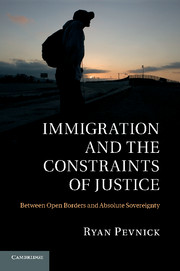Book contents
- Frontmatter
- Contents
- List of illustrations
- Acknowledgments
- 1 Introduction
- 2 Statism, self-determination, and associative ownership
- 3 Refining associative ownership
- 4 Rights-based arguments for open borders
- 5 Distributive justice and open borders
- 6 The significance of national identity
- 7 Applications
- Bibliography
- Index
6 - The significance of national identity
Published online by Cambridge University Press: 24 February 2011
- Frontmatter
- Contents
- List of illustrations
- Acknowledgments
- 1 Introduction
- 2 Statism, self-determination, and associative ownership
- 3 Refining associative ownership
- 4 Rights-based arguments for open borders
- 5 Distributive justice and open borders
- 6 The significance of national identity
- 7 Applications
- Bibliography
- Index
Summary
Perhaps the most common type of argument put forward to defend the state's right to restrict immigration hinges on the putative importance of shared national identity. Historically such concerns have played an important role in public discourse surrounding immigration policy. Although, as noted above, the country's early years saw little restriction of immigration, this lack of legislation was not a reflection of the public's lack of interest. Instead, concerns about the identity of the fledgling nation were of immediate significance. Several anti-immigration and anti-Catholic riots took place in New England during the 1830s and 1840s (Daniels 2004, 10). Likewise, the infamous Know-Nothings built a strong following, even entering Millard Fillmore into the 1856 presidential election and holding forty-three House seats between 1855 and 1857 (Tichenor 2002, 62).
About a century after independence, the first major piece of immigration legislation, the 1882 Chinese Exclusion Act, banned the entry of Chinese laborers (but not merchants) for ten years. President Cleveland justified such restrictions by insisting that the
experiment of blending the social habits and mutual race idiosyncrasies of the Chinese laboring classes with those of the great body of the people of the United States [has] proved by the experience of twenty years … in every sense unwise, impolitic, and injurious to both nations.
(quoted in Daniels 2004, 20)Likewise, in Senate debate Chinese migrants were described as “hordes of heathens that swarm like rats in a cellar” and “aliens in blood, aliens in faith, and clogs to the free movement of the wheels of Christian civilization and enlightened progress … A degraded people” with “nothing in their civilization that has an elevating tendency” (quoted in Calavita 2000, 11).
- Type
- Chapter
- Information
- Immigration and the Constraints of JusticeBetween Open Borders and Absolute Sovereignty, pp. 133 - 162Publisher: Cambridge University PressPrint publication year: 2011

